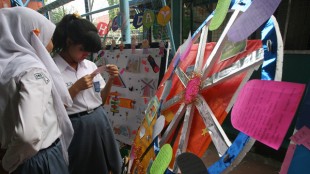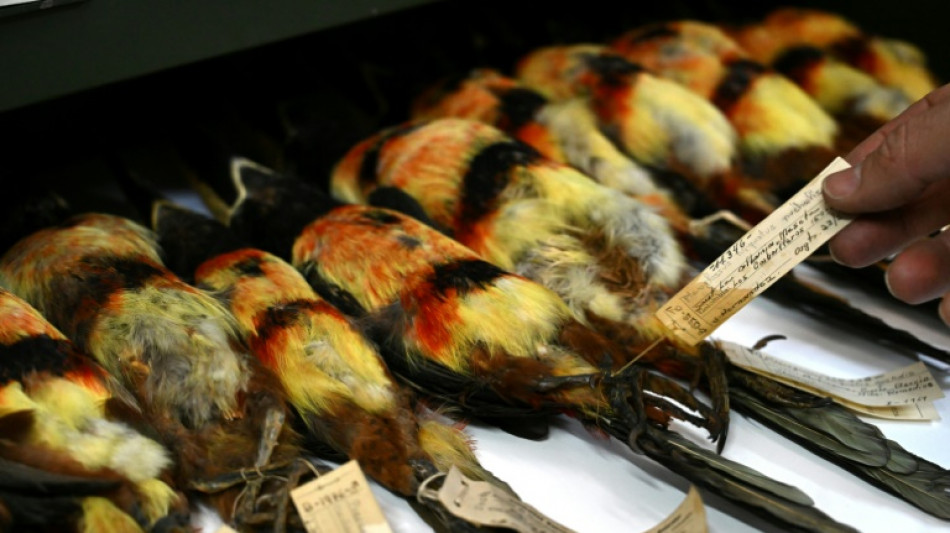
-
 Moscow chokes Telegram as it pushes state-backed rival app
Moscow chokes Telegram as it pushes state-backed rival app
-
ArcelorMittal confirms long-stalled French steel plant revamp

-
 New Zealand set new T20 World Cup record partnership to crush UAE
New Zealand set new T20 World Cup record partnership to crush UAE
-
Norway's Ruud wins Olympic freeski slopestyle gold after error-strewn event

-
 USA's Johnson gets new gold medal after Olympic downhill award broke
USA's Johnson gets new gold medal after Olympic downhill award broke
-
Von Allmen aims for third gold in Olympic super-G

-
 Liverpool need 'perfection' to reach Champions League, admits Slot
Liverpool need 'perfection' to reach Champions League, admits Slot
-
Spotify says active users up 11 percent in fourth quarter to 751 mn

-
 AstraZeneca profit jumps as cancer drug sales grow
AstraZeneca profit jumps as cancer drug sales grow
-
Waseem's 66 enables UAE to post 173-6 against New Zealand

-
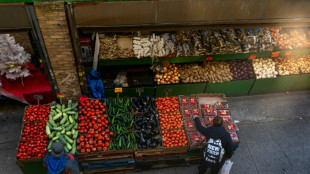 Stocks mostly rise tracking tech, earnings
Stocks mostly rise tracking tech, earnings
-
Say cheese! 'Wallace & Gromit' expo puts kids into motion

-
 BP profits slide awaiting new CEO
BP profits slide awaiting new CEO
-
USA's Johnson sets up Shiffrin for tilt at Olympic combined gold

-
 Trump tariffs hurt French wine and spirits exports
Trump tariffs hurt French wine and spirits exports
-
Bangladesh police deploy to guard 'risky' polling centres

-
 OpenAI starts testing ads in ChatGPT
OpenAI starts testing ads in ChatGPT
-
Three-year heatwave bleached half the planet's coral reefs: study
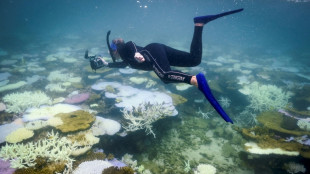
-
 England's Buttler calls McCullum 'as sharp a coach as I ever worked with'
England's Buttler calls McCullum 'as sharp a coach as I ever worked with'
-
Israel PM to meet Trump with Iran missiles high on agenda

-
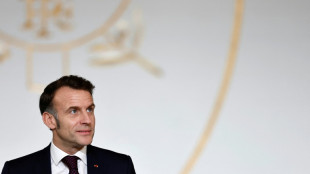 Macron says wants 'European approach' in dialogue with Putin
Macron says wants 'European approach' in dialogue with Putin
-
Georgia waiting 'patiently' for US reset after Vance snub

-
 US singer leaves talent agency after CEO named in Epstein files
US singer leaves talent agency after CEO named in Epstein files
-
Skipper Marsh tells Australia to 'get the job done' at T20 World Cup

-
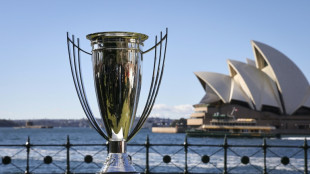 South Korea avert boycott of Women's Asian Cup weeks before kickoff
South Korea avert boycott of Women's Asian Cup weeks before kickoff
-
Barcelona's unfinished basilica hits new heights despite delays

-
 Back to black: Philips posts first annual profit since 2021
Back to black: Philips posts first annual profit since 2021
-
South Korea police raid spy agency over drone flight into North
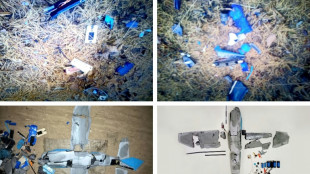
-
 'Good sense' hailed as blockbuster Pakistan-India match to go ahead
'Good sense' hailed as blockbuster Pakistan-India match to go ahead
-
Man arrested in Thailand for smuggling rhino horn inside meat
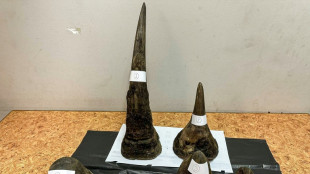
-
 Man City eye Premier League title twist as pressure mounts on Frank and Howe
Man City eye Premier League title twist as pressure mounts on Frank and Howe
-
South Korea police raid spy agency over drone flights into North
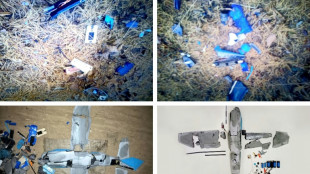
-
 Solar, wind capacity growth slowed last year, analysis shows
Solar, wind capacity growth slowed last year, analysis shows
-
'Family and intimacy under pressure' at Berlin film festival
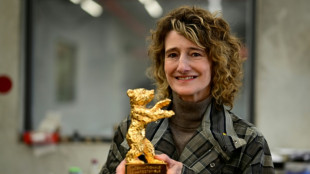
-
 Basket-brawl as five ejected in Pistons-Hornets clash
Basket-brawl as five ejected in Pistons-Hornets clash
-
January was fifth hottest on record despite cold snap: EU monitor

-
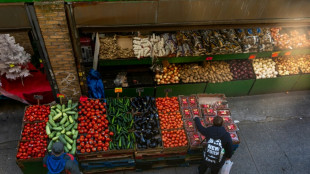 Asian markets extend gains as Tokyo enjoys another record day
Asian markets extend gains as Tokyo enjoys another record day
-
Warming climate threatens Greenland's ancestral way of life
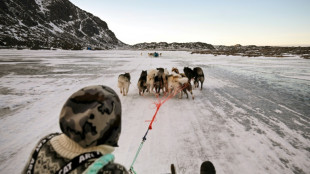
-
 Japan election results confirm super-majority for Takaichi's party
Japan election results confirm super-majority for Takaichi's party
-
Unions rip American Airlines CEO on performance

-
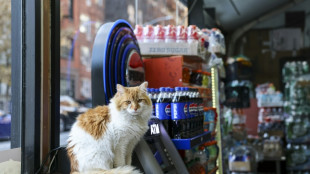 New York seeks rights for beloved but illegal 'bodega cats'
New York seeks rights for beloved but illegal 'bodega cats'
-
Blades of fury: Japan protests over 'rough' Olympic podium

-
 Zelensky defends Ukrainian athlete's helmet at Games after IOC ban
Zelensky defends Ukrainian athlete's helmet at Games after IOC ban
-
Jury told that Meta, Google 'engineered addiction' at landmark US trial

-
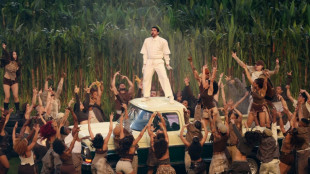 Despite Trump, Bad Bunny reflects importance of Latinos in US politics
Despite Trump, Bad Bunny reflects importance of Latinos in US politics
-
Intrusion Inc. Expands Business Development Efforts With Strategic Leadership Additions

-
 Osa Commerce Launches AI-Powered Retail Compliance at Manifest 2026 Targeting $5 Billion Chargeback Problem
Osa Commerce Launches AI-Powered Retail Compliance at Manifest 2026 Targeting $5 Billion Chargeback Problem
-
Datavault AI Recaps High-Impact Super Bowl LX Weekend with NFL Alumni, Live ADIO(R) Activations, DVHOLO(TM) and Tokenization

-
 Aspire Biopharma Regains Compliance with Nasdaq Minimum Bid Price Requirement
Aspire Biopharma Regains Compliance with Nasdaq Minimum Bid Price Requirement
-
Charlie's Holdings (OTCQB:CHUC) Selected for FDA Premarket Tobacco Product Applications Meeting


'Irreplaceable' Colombian bird collection at risk
Under a cracked and leaky ceiling, Andres Cuervo works on a colorful, dead hummingbird for the ornithological collection of the National University of Colombia, the country with more bird species than any other.
Condors, eagles and even extinct birds receive a "second life" at the table of the biologist, who preserves them for science and posterity.
But rather than a pristine setting with regulated temperature and moisture levels, the valuable collection of some 44,000 stuffed birds is housed in metal pull-out drawers in a dilapidated public building.
And in January, a heavy downpour over Bogota put Cuervo's collection at risk.
The water "fell in cascades on these cabinets," he recalled, pointing, clearly still distressed at nearly losing his "irreplaceable" avian stockpile.
One drawer contains hundreds of blue and green hummingbirds each no larger than a bumblebee. From another, Cuervo pulls a huge harpy eagle with a wingspan of over two meters (6.5 feet).
There are also several specimens of a bird that went extinct in the 1970s.
"We got out the buckets, the plastic (sheets), anything to protect the collection," recounted his colleague Gary Stiles, a preeminent American ornithologist who has worked in Colombia since 1990 and discovered several new species.
Fortunately, the damage could be limited to the tails of a handful of birds and the labels that identified them. This time.
- 'Ironic' -
"It is ironic that with the most diverse avifauna (on the planet) we have one of the most endangered collections," said Stiles of conditions at the Institute of Natural Sciences, where the ornithological collection is held.
With about 2,000 different species -- a fifth of the global total and 82 of them endemic -- Colombia is known as "the country of birds," according to green group WWF.
"It is partly due to the topography. Only in Colombia do the Andes divide into three distinct high mountain ranges, separated by deep valleys that form natural barriers," explained Stiles.
"This facilitates the isolation of populations and the formation of diverse species."
But this natural wealth contrasts with the economic difficulties faced by public universities in Latin America's fourth biggest economy.
Successive rectors of the National University have decried a lack of financing.
According to research by the institution itself, the country's 33 public universities have a shortfall of about 18 billion pesos or some $4.8 million.
State funding has been cut almost by half from 1994.
The shortfall is evident in the corridors of the institute.
In August 2023, a 6.1-magnitude earthquake shook the capital and "magnified some cracks" in the walls, recalled Cuervo. A classroom had to be shuttered due to a risk of collapse.
"I go home every day thinking about this collection... the accumulation of small incidents can lead to something quite serious," the biologist said.
- 'Unique and irreplaceable' -
The birds at the institute are not on display. They leave the metal cabinets only to be studied.
"They are unique and irreplaceable because they were collected in different places and at different times. They represent the geographical history of the country," said Cuervo of his life's work.
Each specimen has a label with its place and date of collection. The oldest dates from 1914, its colors still intact.
Thanks to the collection, researchers have been able to study how warm weather species have colonized new territories as global temperatures rise due to climate change.
They can also see how savanna and grassland birds have thrived even as forest species have declined as their habitat has been destroyed for farming or construction.
"As a society we can use (the information gathered) to solve problems that have to do with biodiversity," added Cuervo before starting work on a new hummingbird.
He makes an incision in the tiny chest to separate the bird’s skin from the flesh. He then stuffs the skin with cotton and places it in a small cardboard oven that works only with lightbulbs to prevent any degradation.
Humidity and light are the main threats to his stuffed birds.
"Colors, proportions and plumage are preserved over time. It’s almost like immortalizing an individual," Cuervo said proudly of his work.
A.Malone--AMWN

